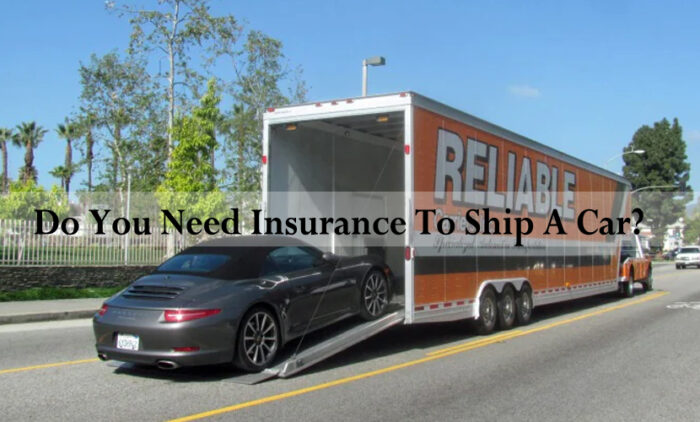Do you need insurance to ship a car? When it comes to transporting your car, whether it’s a cross-country journey or just a state away, using auto transport services can be a real lifesaver in terms of convenience and efficiency. However, once you’ve decided to go down this route, there are a few important things to consider.

First and foremost, you might find yourself asking: “Do I need insurance when shipping my car?” This question is key, especially if you’re concerned about keeping your vehicle safe and secure during its journey.
Understanding car transport insurance can feel like a bit of a maze at first. There are different types of coverage to think about, including your own car insurance and policies offered by the transport company. Plus, the type and value of your vehicle can play a role in determining what coverage you’ll need.
So, while auto transport services can be a great option for getting your car from point A to point B, it’s essential to make sure you have the right insurance coverage in place to protect your prized possession along the way.
Do You Need Insurance To Ship A Car?
Whether you require an insurance policy to ship your car depends on several factors, including your personal risk tolerance, the policies of the shipping company, and the value of your vehicle. Here are some additional factors to take into account:
Gap Coverage
You may wish to explore additional insurance coverage if there’s a significant difference between the value of your car and what your carrier’s insurance covers. You can obtain this coverage through a third party or your insurer.
Additionally, gap coverage can provide protection if your car sustains damage during shipment that exceeds the carrier’s coverage limits.
Carrier’s Insurance
Many reputable car transport companies offer liability insurance policies that typically cover damages to your car during transit. However, it’s essential to verify this coverage before selecting a shipper.
Request proof of insurance and carefully review what is covered and what is not. It’s important to be aware of any limitations to their coverage to ensure you’re adequately protected.
Your Car Insurance
You can check with your car insurance company to see if your policy includes coverage for your car during transportation. While some policies may offer this service as part of your comprehensive coverage, it’s not universal.
Type Of Transport
The type of transport you choose can also impact your decision. Enclosed transport offers more protection against road debris and other elements compared to open transport, potentially lowering the risk of damage.
However, enclosed transport tends to be more costly. Therefore, by evaluating the value of your vehicle, you can decide between these options and contemplate additional insurance if you opt for open transport.
Destination Considerations
Insurance requirements may vary when shipping your car internationally due to differing rules and regulations in each country regarding car transport insurance. Additionally, the risks involved in long-distance, international shipments may necessitate applying for additional coverage to ensure comprehensive protection for your vehicle.
Before shipping your car, it’s essential to conduct thorough research and ask questions to gain a better understanding of the process. It’s important to determine the carrier’s maximum limits and confirm your coverage.
Also, find out if you require extra insurance for your specific situation. Taking these steps will help ensure peace of mind throughout the shipping process.
What Do I Need To Ship My Car?
When making plans to ship your car, there are certain documents that you will need to provide to complete the process. They include:
- Proof of insurance.
- Bill of lading.
- Photo ID.
- Title and registration.
- Insurance terms and conditions.
Even though these documents vary by auto transport company, these are the basic information and documents that you should prepare.
How To Get Insurance To Ship A Car
Here are the steps you need to follow if you want to get an insurance policy to ship or transport your car from anywhere:
Confirm The Auto Transport Company’s Insurance
First and foremost, to ensure your car’s protection, it’s essential to confirm and fully understand the shipping company’s insurance policy. When requesting proof of insurance, inquire about the coverage details. Understanding the limits and exclusions of the transporter’s insurance is necessary for peace of mind during the shipping process.
Speak With Your Car Insurance Company
After you have gotten the details and information about the transporter’s insurance policy, contact your insurance company. Give them the details of your shipping plan as well as the coverage the transporter will be offering.
In addition to this, confirm if your current policy extends to shipping and what the terms are if they do. By doing this, you will find out whether your policy fills any gaps in the auto transporter’s insurance coverage.
Consider Buying Additional Insurance
If, after consulting with your insurer, you discover that your coverage is insufficient, you might want to explore additional coverage for the shipping period. This is typically arranged through a third party or your existing insurance company that specializes in shipping or cargo insurance.
Understand The Type Of Transport
The choice of transport method for your car can impact your insurance requirements. Enclosed transport, as mentioned previously, provides greater protection against the elements and potential road debris compared to open transport, albeit at a higher cost.
However, the decision ultimately hinges on the value of your car and your personal risk tolerance. While enclosed transport may incur additional expenses, the heightened protection it offers could significantly reduce the necessity for supplementary insurance coverage.
Conclusion
Shipping your car can be a convenient solution for long-distance or international transportation needs, but it comes with important considerations regarding insurance coverage.
Before entrusting your vehicle to a shipping company, it’s vital to thoroughly understand their insurance policy, including coverage limits and exclusions.
Additionally, assessing your own car insurance coverage and considering additional insurance options, particularly for international shipments or if your existing coverage is insufficient, is important for protecting your vehicle during transit.
The type of transport method you choose, such as enclosed or open transport, also plays a significant role in determining your insurance needs. While enclosed transport offers greater protection, it comes with a higher cost, which should be weighed against the value of your car and your risk tolerance.
By conducting thorough research, asking questions, and carefully evaluating your insurance options, you can ensure that your car is adequately protected throughout the shipping process.
Ultimately, taking these steps will provide you with peace of mind, knowing that your vehicle is safeguarded against any unforeseen risks or damages during transit.



